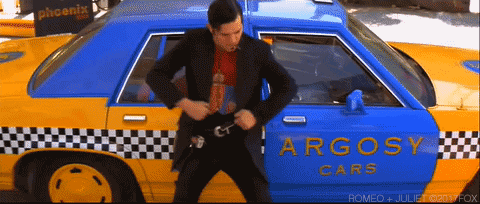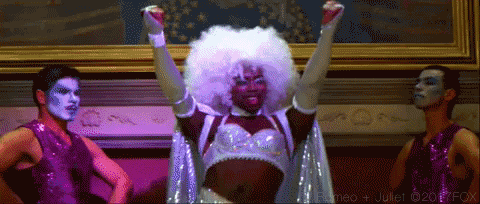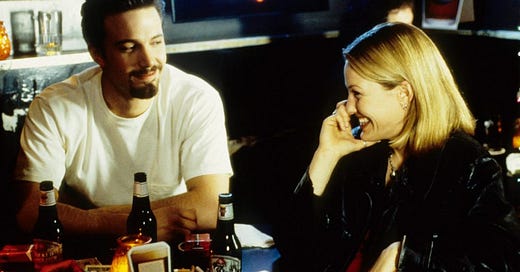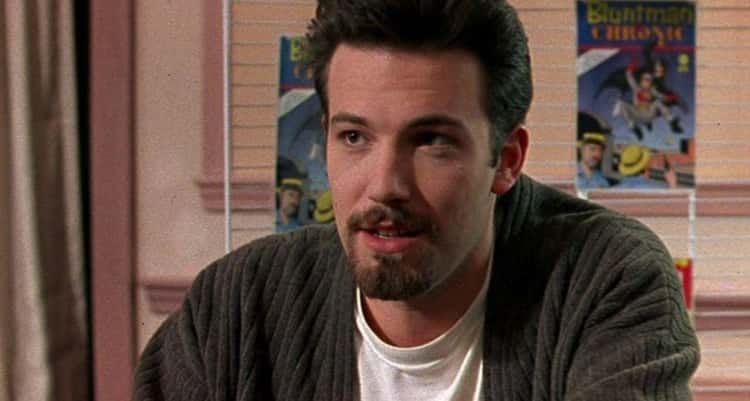There are, like, four movies that I hold directly responsible for my bisexuality. (Gen Z, this is satire.) One of them—the 1999 classic The Mummy—I’ve discussed at length. One of them—Bring It On—I’ve discussed in brief. One of them—William Shakespeare’s Romeo + Juliet—needs almost no explanation. I’ll just let these two gifs speak for themselves.


But one of them needs, I think, a lot of explanation. I refer of course to the extremely polarizing Chasing Amy.
This movie got to me early. It was one of those that seemed to be on all the time when I was a teen, on one of the lower-tier premium channels. I had tried and failed to enjoy Clerks, since it was heralded as a classic of the 90s indie boom. But I found that movie’s look distractingly ugly, and the actors distractingly amateurish. On the other hand, Chasing Amy had a cozy mid-90s look, and Kevin Smith’s beloved muse—Ben Affleck before his Armageddon teeth—at the center. Plus, Smith finally had something more personal to say than “working here sucks.”
That something more personal to say often gets reduced to “Ben Affleck falls in love with a lesbian,” even by the movie’s own marketing. Fortunately, the movie is more complicated than that. Ben Affleck’s Holden (lol. lmao) falls in love with Joey Lauren Adams’s Alyssa, who refers to herself as gay; we come to learn that she uses that word as more of an umbrella term, the way I now use “queer.” And, controversially, Alyssa falls in love with Holden too.
(How much of my adolescence did I spend chasing after the teenage versions of Ben Affleck in this movie? All the much. Every much. I had admittedly tragic taste in men until, like, nine years ago. So Alyssa Jones falling for this guy, a witty, condescending, goofball of a comic book artist for whom a flannel overshirt represents real sartorial effort, doesn’t strike me as that outlandish.)
But the movie quite directly and explicitly rejects the eye roll-inducing fantasy narrative of a mediocre straight man who turns a lesbian out because he’s just that irresistible of a stud. In fact, compulsive heterosexuality and the narrowness that comes with it is the out-and-out villain of the story. It’s what tears everything apart.
One of my favourite scenes in the movie foreshadows this doom beautifully. Holden and his best friend Banky (Jason Lee at his most blisteringly charismatic) are at what they didn’t realize was a lesbian club for what Holden thought was a setup for him and Alyssa. Holden is quietly fuming over Alyssa being very much with another woman, while Banky is openly, grossly ogling Alyssa as she makes out with said woman. After some belligerent homophobic questioning, Banky and Alyssa become Quint and Hooper in the scar scene from Jaws, gleefully swapping sex injury stories and cracking each other up while Holden—the Brody—stews in his relative inexperience.
It’s a surprisingly charming scene, until Banky feels compelled to douse it with the cold water of another homophobic question. And that in a nutshell is the tragedy of the movie. These are people who should be friends, but because of Banky’s refusal to let go of his homophobia, and his place in a perceived social hierarchy, they can’t be. Sadly, that’s where this love story is going, too. Holden can’t help but center his sexual conservatism and attendant feelings of inadequacy, at the cost of his two dearest relationships. But there’s some beautiful shit before that ending.
After Holden makes my favourite cinematic love confession of all time, the ne plus ultra of “I’m hopelessly in love with my friend and I cannot physically stop myself from saying it,” he and Alyssa get together. Their romance enrages Banky, who is deeply jealous of how much time and energy Holden devotes to Alyssa; and alienates Alyssa from her lesbian friends, because that’s how lesbians in the late 90s were acting, allegedly. But the “us against the world” energy keeps propelling them further into each other’s arms, and they’re blissed out at being together. In a post-coital cuddle, Holden asks, “why me?” (Specifically, why me, a man?) In response, Alyssa launches into her best monologue of the movie.
“I came to this on my own terms. Y'know, I didn't just heed what I was taught: men, women should be together; it's the "natural" way--that kinda thing. I'm not with you because of what family, society, life tried to instill in me from day one. The way the world is—how seldom it is that you meet that one person who just gets you. It's so rare[….]And to cut oneself off from finding that person...to immediately halve your options by eliminating the possibility of finding that one person within your own gender—that just seems stupid to me. So I didn't. But then you came along. You, the One Least Likely. I mean, you were a guy[…]And while I was falling for you, I put a ceiling on that, because you were a guy. Until I remembered why I opened the door to women in the first place. To not limit the likelihood of finding that one person who could complement me so completely. So here we are. I was thorough when I looked for you. And I feel justified lying in your arms. 'Cause I got here on my own terms and I have no question about some place I didn't look. And for me that makes all the difference.”
That speech resonated with me in a way I couldn’t put into words when I was 13. I didn’t even know the word “bisexual” yet. But I knew that Alyssa’s adolescent confusion at the idea that she should naturally close herself off to an entire gender mirrored my own. And her absolute certainty in who she was, and her insistence on finding her own path to love, rang so true to me that it burrowed into my heart. Rewatching this movie at my big age, I teared up at this scene, grateful that baby Marion found this movie when she did.
The movie is very white, very male, very Gen X, and probably a 1 on the Kinsey Scale. But those are all demographic indicators, not markers of value. I didn’t need the storyteller to satisfy an identity checklist for me to find a spiritually compelling perspective in the story. This is part of why the “someone who looks like me” understanding of representation has always felt so reductive to me. None of these cats look anything like me. But they feel like me. They fumble and fall in love like me. I found me in this movie before I fully knew me.
I’m sure if Chasing Amy were made today, it wouldn’t have the straight white Jersey boy who doesn’t believe sex is real without penetration as its protagonist. It wouldn’t have all of the queerphobic slurs that it does—although, fascinatingly, the movie nails the era’s in-group/out-group usage of said slurs. It wouldn’t have Ben Affleck’s extremely irritating facial hair. It would be something very different, for a very different audience. But this movie was something very significant to me, warts and all, and I am forever changed by what it is and what it’s meant to me.





Have you seen the documentary Chasing Chasing Amy?
Also: you triggered a memory in me, at age 14--I was in my Catholic school's production of Godspell, and we were trying to figure out who should partner up with whom in a certain choreography sequence, I think a sexy one for "Turn Back O Man." I immediately thought that it would make sense blocking-wise if I partnered with Laurie (a girl). And then....VERY slowly...the understanding that we couldn't, that that wasn't allowed, that that wouldn't fly, overtook my instinctual certainty. I've always remembered that moment.